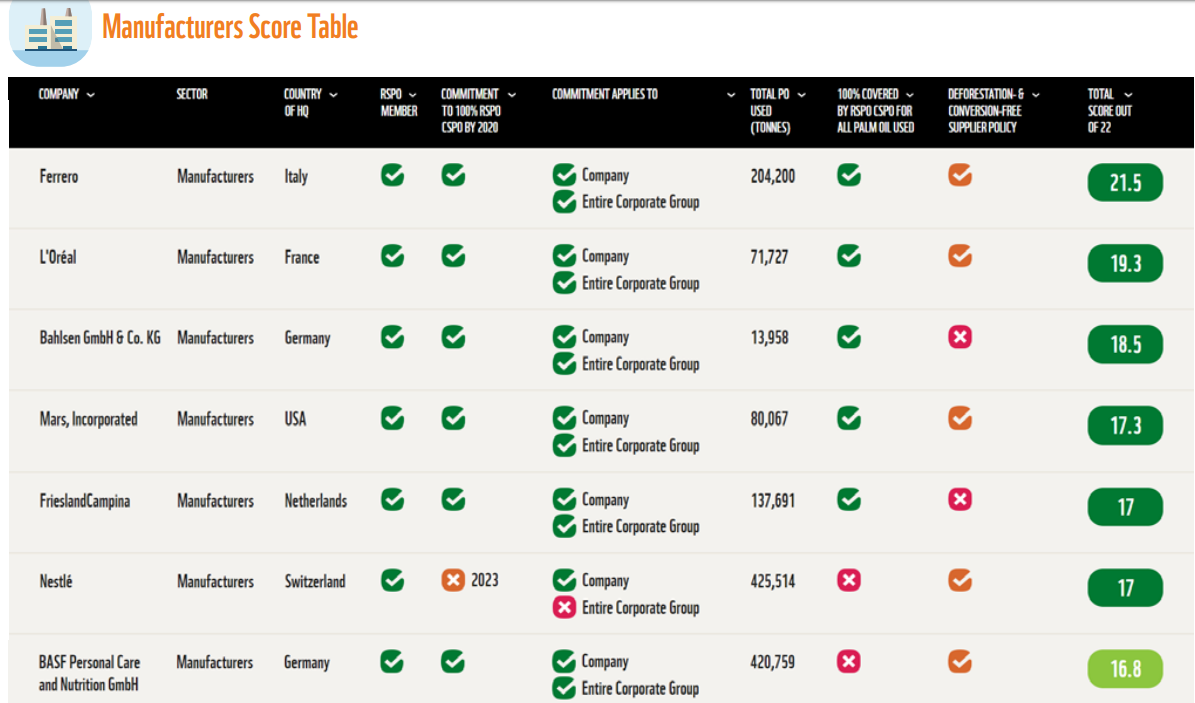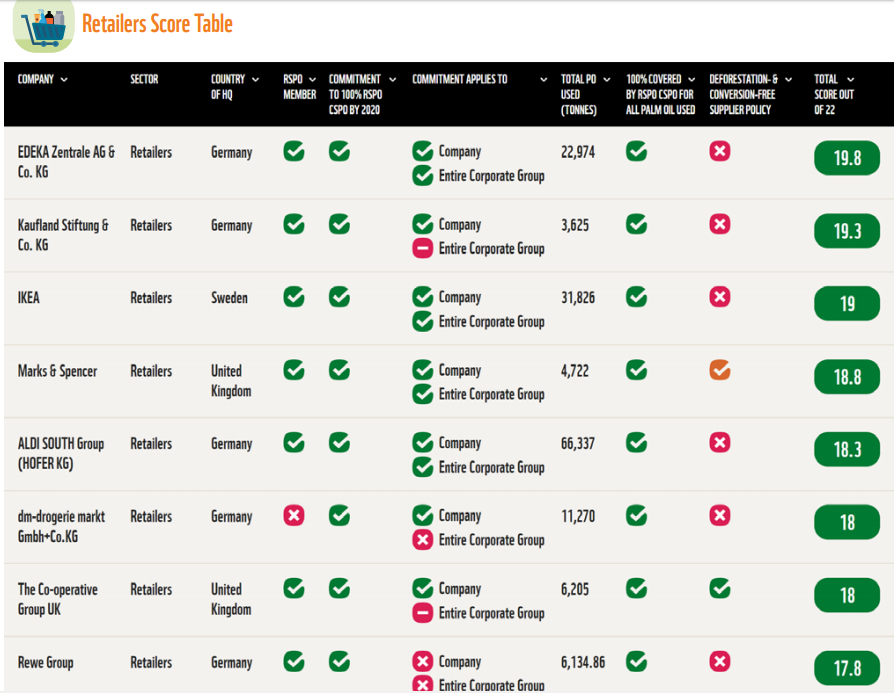On the eve of the World Economic Forum’s annual meeting in Davos, as companies prepare to gather to set the agenda for a more sustainable world, WWF’s palm oil scorecard reveals that they are falling short when it comes to supporting sustainable palm oil production and tackling tropical deforestation. No company has attained the top score in WWF’s new assessment, which reviews what global brands are doing to reduce adverse impacts caused by the unsustainable sourcing of the most popular vegetable oil from vulnerable tropical habitats.
When produced irresponsibly, palm oil can have a devastating impact on forests, species, communities and the global climate. Despite many long-standing commitments by brands and industry coalitions to eliminate the destruction of nature, including deforestation, from their palm oil supply chains, the scorecard shows that most companies still have a long way to go before they can prove to consumers that they are delivering on these promises. Meanwhile, only one company, the consumer goods manufacturer Ferrero (see Dutch press release), has scored over 20 points (out of the maximum 22), sending an encouraging signal to the rest of the industry that sustainable and deforestation-free palm oil is achievable. Rounding out the top 5 companies in the scorecard are Edeka, Kaufland, L’Oréal and IKEA.
In this fifth edition of a decade-long series, the new WWF’s Palm Oil Buyers Scorecard examines173 major retailers, consumer goods manufacturers and food service companies from the US, Canada, Europe, Australia, Singapore, Indonesia and Malaysia. Companies range from iconic brands such as Carrefour, L’Oreal, McDonald’s, Nestlé, Tesco, and Walmart among others. As we enter 2020 and a new decade, this Scorecard has reset the bar for companies with the expectation that they take commensurate, accelerated action in response to the planet’s escalating environmental and climate challenges.
The Scorecard reveals that the membership of the Consumer Goods Forum (CGF), an industry platform of retailers and manufacturers through which member companies have pledged to eliminate deforestation in their supply chains, are lagging behind in their commitments and actions on sustainable palm oil. Of the 53 CGF member companies included in the Scorecard, only ten (Ferrero, Kaufland, L’Oréal, Marks & Spencer, dm-drogerie markt, The Co-operative Group UK, Rewe Group, Mars, FrieslandCampina and Nestlé) have showed they are leading on sustainable palm oil by scoring in the top 10%. The performance of this handful of leaders is commendable, though it should be the rule rather than the exception for companies that have committed to be deforestation-free by 2020. WWF expects all CGF members to urgently step up and take the lead on sustainable palm oil in accordance with their stated mission to “secure consumer trust and drive positive change.”
Expanding on its previous Scorecards, WWF measured not only how companies performed on basic steps such as using 100% sustainable palm oil in their own supply chains, but also additional actions that prove a company is truly acting responsibly. This includes actions to protect and positively benefit smallholders, communities and biodiversity on the ground in the landscapes most at risk from irresponsible palm oil expansion. The Scorecard reveals that only about 1/4 of assessed companies are investing in on-the-ground initiatives in areas at risk for unsustainable palm oil development. WWF calls for more companies to follow suit and take such actions that proactively contribute to a global solution.
“Given the challenges faced by our planet today, coupled with the devastating effect that unsustainable palm oil has had, companies need to do more than simply reduce their own supply chain risk,” said WWF Palm Oil Lead Elizabeth Clarke. “As we enter 2020, companies need to accept their responsibility to support sustainable palm oil, including taking actions that are bigger, bolder and faster than ever before as part of a pro-environment agenda.”
Even on the essential actions we expect companies to take, including sourcing 100% certified sustainable palm oil (CSPO), the results are disappointing. Overall, less than half of Scorecard companies source 100% CSPO. While just over two-thirds of Scorecard companies have committed to source 100% CSPO by 2020, of those only around 60% have managed to achieve this goal. Meanwhile, only ¼ of all companies in the Scorecard have policies that require their suppliers to be deforestation-free.
Even more disappointing is that nearly one-quarter of companies still have made no commitments at all on sustainable palm oil. This includes a substantial number of companies from Asia. While Asian markets have previously lagged behind on sustainability, WWF has included Singaporean, Indonesian and Malaysian brands in this global edition of the Scorecard for the first time with the expectation that they start to close this sustainability gap.
“The good news is that 2020 represents a tremendous opportunity for companies to join policy makers and consumers to commit to palm oil that no longer harms nature or forests,” says Clarke. “This effort on palm oil is a vital component of an ambitious New Deal for Nature and People that sets nature on the path to recovery by 2030. With nature under unprecedented pressure, we must act together in 2020 to secure a sustainable future for people and planet. We expect companies to rise to this challenge.”
WWF will give palm oil buyers the chance to demonstrate that they are taking the bold action that is needed when it publishes another edition of the Palm Oil Buyers Scorecard at the end of 2020.




